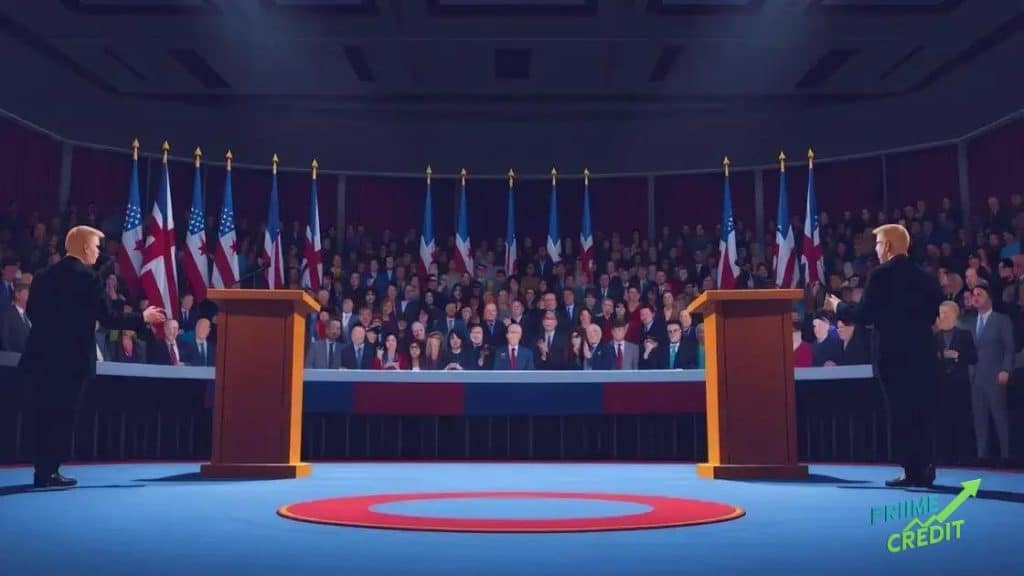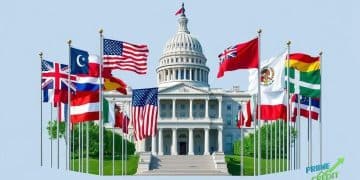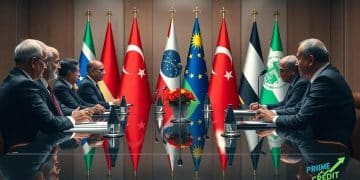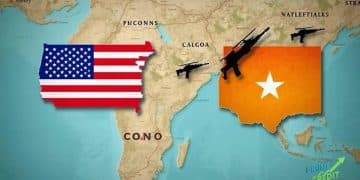Debates over U.S. involvement in global conflicts

The future of U.S. involvement in global disputes will hinge on adapting strategies to emerging technologies, public sentiment, and maintaining strong international partnerships, while emphasizing diplomacy over military action.
Debates over U.S. involvement in global conflicts spark intense discussions about the nation’s role on the world stage. Have you ever wondered how these decisions affect lives both at home and abroad? Let’s explore this multifaceted issue together.
Historical context of u.s. military interventions
The historical context of U.S. military interventions provides critical insights into why the nation engages in conflicts abroad. Understanding this background helps us grasp the motivations, consequences, and reactions from both U.S. citizens and foreign nations.
Many experts point to events like World War II and the Cold War as pivotal moments that shaped U.S. military policy. In the aftermath of these global events, the U.S. emerged as a superpower with a significant role in international affairs.
Key Military Interventions
Throughout the decades, several military interventions stand out due to their lasting impacts:
- Vietnam War: A controversial conflict that raised questions about U.S. involvement.
- Gulf War: Highlighted the U.S. role in defending Kuwait and its interests in the region.
- Afghanistan War: Initiated in response to 9/11, it exemplifies the U.S. commitment to counter-terrorism.
These interventions illustrate various strategies employed by the U.S., each reflecting the political climate and public sentiment of their time. As a result, the U.S. has often been seen as a force for democracy, but critics argue that some actions have led to unintended consequences.
Another important factor to consider is how the domestic landscape influences military decisions. Public opinion can sway leaders, forcing them to justify their actions to constituents. For example, after high casualties, American support for the Vietnam War decreased dramatically.
Over time, military interventions have evolved with changes in technology and strategy. The shift towards drone warfare and cyber operations showcases a modern approach to military engagement, illustrating how traditional conflicts transform in today’s world.
In summary, the historical context of U.S. military interventions reveals much about the nation’s foreign policy dynamics and the complexities surrounding each conflict.
The ethical implications of intervention

The ethical implications of intervention are complex and often debated among scholars, politicians, and the public. When a nation decides to intervene in another country’s affairs, several moral questions arise.
One primary consideration is whether it is right to intervene in a sovereign nation. This raises issues about national sovereignty versus humanitarian aid. Proponents argue that intervention can save lives, especially in cases of genocide or severe human rights violations. However, critics contend that such actions may infringe on the rights of nations to govern themselves.
Arguments for Intervention
Supporters of military intervention often present several reasons to justify their stance:
- Preventing humanitarian crises: Intervention can stop atrocities and protect vulnerable populations.
- Stabilizing regions: Military action might help to establish order and peace in chaotic areas.
- Promoting democracy: By supporting specific groups, interventions can encourage democratic governance.
While these arguments make the case for intervention, the consequences still warrant careful examination. Each military action can lead to unexpected results, necessitating a well-thought-out approach.
On the other side, one must consider the risks involved with intervention. There can be significant backlash against foreign involvement, causing further instability. Local populations may view intervening forces as occupiers rather than protectors. Misunderstanding cultural contexts can worsen situations, leading to resentment.
Long-term Effects
The long-term effects of intervention often complicate future decisions as well. After military interventions, countries may struggle with rebuilding their societies. For example, Iraq and Afghanistan faced immense challenges following U.S. interventions.
As the world continues to confront moral dilemmas surrounding military intervention, nations must weigh the need for action against the potential for adverse outcomes. Balancing these factors is crucial when determining whether intervention is justified.
Effectiveness of u.s. strategies in conflicts
The effectiveness of U.S. strategies in conflicts is a topic that draws considerable attention and debate. Many have questioned whether these strategies have truly achieved their intended goals.
Historically, the U.S. has employed various approaches in military engagements. The combination of diplomacy, economic sanctions, and military force aims to achieve strategic objectives. Each conflict presents unique challenges, which can influence the success of these strategies.
Key Considerations in Effectiveness
Several factors determine the overall effectiveness of U.S. strategies in conflicts:
- Political Objectives: Clearly defined goals help guide military actions and diplomatic efforts.
- Local Support: Gaining trust and support from local populations can enhance the success of interventions.
- Coalition Building: Working with international partners strengthens legitimacy and resources.
When evaluating the success of these strategies, it’s essential to analyze how they play out in practice. For instance, in Iraq, U.S. military strategies faced significant challenges, including insurgency and a complex cultural landscape. While some objectives were met, long-term stability remains elusive. In contrast, operations in the Gulf War were largely perceived as successful due to swift military action and clear objectives.
Public perception also plays a vital role in assessing effectiveness. When citizens see tangible results, support for strategies tends to grow. Conversely, when conflicts drag on without clear improvement, public opinion often shifts negatively. This dynamic requires U.S. leaders to be aware of the sentiments at home while pursuing foreign strategies.
Adapting Strategies
As global situations evolve, so must the strategies employed. The rise of asymmetric warfare and terrorism has prompted the U.S. to adapt its military and strategic approach. New techniques, including cyber warfare and special operations, demonstrate a shift towards more modern conflicts.
Ultimately, measuring the effectiveness of U.S. strategies in conflicts involves a continuous review of objectives, outcomes, and public sentiment. Understanding these elements allows for better decision-making in future engagements.
Public opinion and its impact on policy
Public opinion significantly influences U.S. foreign policy decisions. When the public is engaged, leaders often feel compelled to take actions that reflect the prevailing sentiments.
The media plays a crucial role in shaping public opinion regarding foreign interventions. News coverage can highlight humanitarian crises or threats, prompting a reaction from the public. For example, the images and stories from conflict zones can evoke strong emotional responses, which may lead to calls for government action.
Factors Influencing Public Opinion
Several elements contribute to how the public perceives military intervention:
- Media Representation: The way conflicts are portrayed in the news can shape perceptions of their necessity and morality.
- Political Leadership: Statements and actions from political leaders can sway public sentiment positively or negatively.
- Personal Experiences: Veterans and their families often have a unique perspective that can influence the wider community’s views.
Understanding the factors that shape opinion helps explain the fluctuations in support for various military actions. When citizens feel informed and connected to the issues, they are more likely to support, oppose, or advocate for U.S. involvement in global conflicts.
In times of crisis, leaders must navigate public sentiment carefully. For instance, when American lives are lost, there tends to be a surge in public scrutiny regarding the reasons for intervention. This scrutiny can lead to significant policy shifts, as politicians seek to maintain public trust and approval.
The Role of Polling
Polling is another tool used to gauge public sentiment regarding foreign policy. Polls reveal insights into how individuals feel about U.S. actions abroad. High poll numbers in favor of military action can lead leaders to act swiftly, while low numbers may result in hesitation or policy change.
Ultimately, public opinion not only reflects the thoughts of citizens but also serves as a guide for policymakers. Leaders often weigh public sentiment against geopolitical realities when making decisions. This complex interplay shapes how the U.S. navigates its role in international affairs.
The future of u.s. involvement in global disputes
The future of U.S. involvement in global disputes is uncertain and heavily debated. As international dynamics shift, the approach to foreign policy and military engagement will likely evolve.
One significant factor influencing future involvement is the changing nature of warfare. As conflicts become more complex, traditional military strategies may need to adapt. The rise of cyber warfare and non-state actors indicates a shift away from conventional battles. This transformation calls for innovative strategies to address new challenges.
Emerging Global Dynamics
Several trends are shaping the U.S. approach to global disputes:
- Increased collaboration with allies: Strengthening partnerships with NATO and other allies emphasizes collective security.
- Focus on diplomacy: The U.S. may prioritize diplomatic solutions over military intervention, particularly in volatile regions.
- Strategic competition with China and Russia: As these nations rise, the U.S. must navigate a more complex geopolitical landscape.
Within this context, the U.S. will continue to reassess its global commitments. While military options remain, greater emphasis may be placed on other tools such as economic sanctions and soft power. These alternatives can help manage global disputes without the negative consequences of military action.
Public opinion also plays a crucial role in shaping future U.S. involvement. Citizens are increasingly concerned about the costs of foreign wars, both in terms of lives and finances. Leaders will need to balance these concerns with the need to maintain global stability and uphold U.S. interests.
Technological Advancements
The impact of technology cannot be overlooked. Advancements in artificial intelligence and surveillance capabilities can provide new ways to engage in global disputes. Utilizing technology not only enhances military effectiveness but can also assist in humanitarian efforts by providing aid where it is most needed.
As the world continues to evolve, the U.S. will face tough decisions regarding its role in international conflicts. Understanding these dynamics will be essential for policymakers as they navigate the future landscape of global involvement.
In summary, the future of U.S. involvement in global disputes will be shaped by various factors, including emerging technologies and evolving public opinion. As the world changes, the U.S. must adapt its strategies and explore new avenues for engagement. By balancing military action with diplomacy and fostering international partnerships, the U.S. can navigate complex global challenges effectively. Understanding these dynamics will be vital for policymakers as they seek to maintain stability and secure U.S. interests abroad.
FAQ – Frequently Asked Questions about U.S. Involvement in Global Conflicts
What factors influence U.S. strategies in global disputes?
U.S. strategies are influenced by emerging technologies, public opinion, international partnerships, and the evolving geopolitical landscape.
How does public opinion affect U.S. foreign policy?
Public opinion plays a crucial role by shaping leaders’ decisions. When citizens support intervention, policymakers are more likely to act.
What role does technology play in future conflicts?
Technological advancements, such as AI and cyber capabilities, provide new methods for engaging in conflicts and improving military effectiveness.
Why is diplomacy prioritized in U.S. foreign policy?
Diplomacy is prioritized to seek peaceful resolutions and prevent military involvement, aligning with public sentiment and economic considerations.





